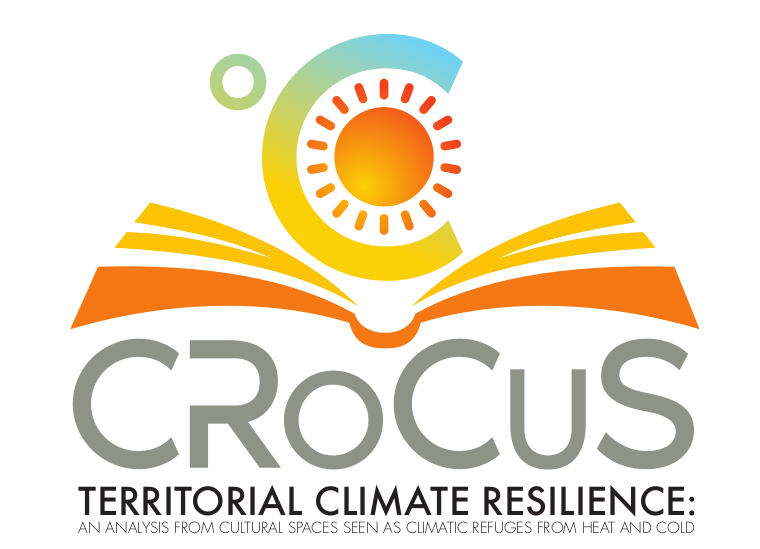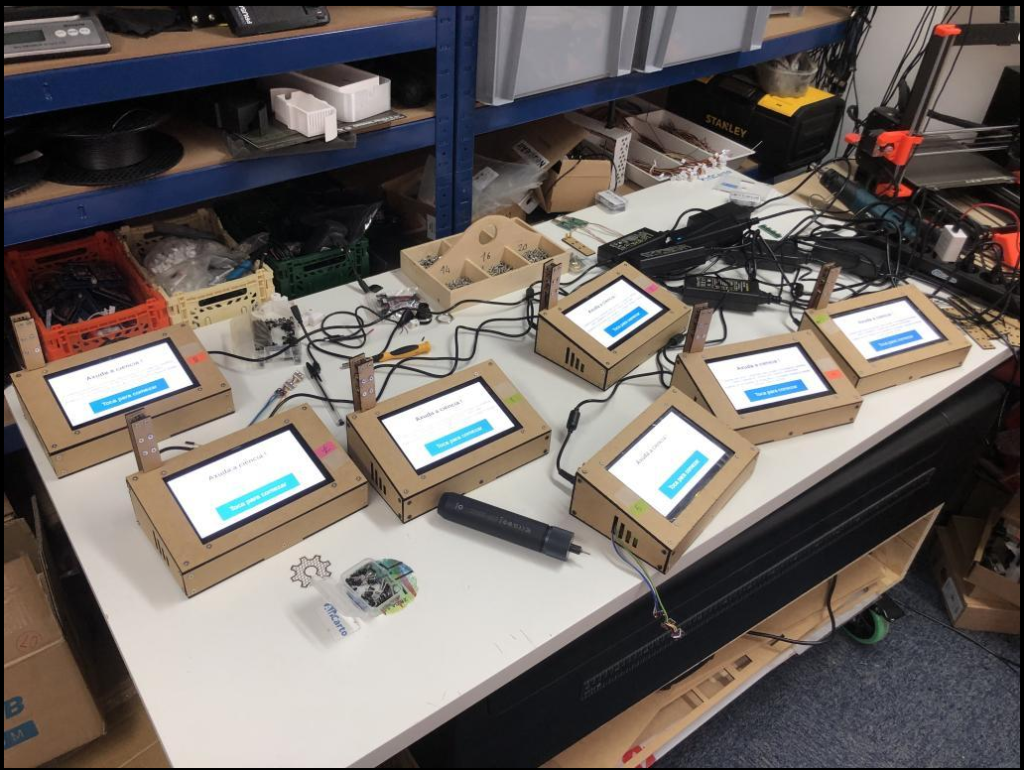
contacts : julia.hidalgo@univ-tlse2.fr ; brais.estevez.villarino@usc.es ; serge.faraut@toulouse.archi.fr; tathiane.martins@toulouse.archi.fr; marion.bonhomme@insa-toulouse.fr; delphine.chouillou@univ-tlse3.fr; guillaume.dumas@toulouse-metropole.fr; pauline.schuppe@univ-tlse2.fr; mariajose.pineira@usc.es
This research explores the possibilities of converting the Galician Public Library Network into a Network of Climate Shelters. Slightly transforming existing infrastructures, climate shelters are public spaces that provide thermal comfort to vulnerable citizens, while maintaining other uses and functionalities.
Research problem :
Critical events linked to the climate emergency threaten in various vays the habitability of the planet. Faced with this, planning policies on climate adaptation and mitigation have recently emerged. At the European level, the EU strategy on Adaptation to Climate Change, approved in February 2021, highlights the need to increase local territorial resilience as one of its key actions. The Global Commission on Adaptation to Climate Change was created in September 2021 with the aim of providing information and specific recommendations in key sectors: food security, natural environment, water, cities and urban areas, infrastructure, disaster risk management and finance. The objective sought by this Commission is to help the territories in the construction of climate resilient
trajectories by 2050. In Spain, the integration of adaptation to climate change in territorial and urban planning is also an objective of the National Plan for Adaptation to Climate Change 2021-2030 recently adopted by the Ministry for the Ecological Transition and the Demographic Challenge.
Climate-resilient development refers to the combination and deployment of climate change adaptation strategies and socio-technical actions aimed at reducing greenhouse gas (GHG) emissions. Its objective is to provide sustainable development for humans and non-humans, understood as a way of development that does not compromise the possibilities or life horizons of future generations. On the one hand, adaptation to climate change seeks to reduce the exposure and vulnerability of natural environments and of society to the impacts and crises derived from climate change, both in the territories and in our ways of life. Ideally, adaptation initiatives should aspire to build a more just and resilient society, understanding climate change as an opportunity to democratically deepen equality and social justice. In addition, to reduce greenhouse gas emissions, a decarbonization of the economy and society is needed; which seems difficult—if not impossible—without incorporating and developing sobriety policies. Sobriety policies refer to the set of daily measures and practices that avoid the demand for energy, materials, land and water, guaranteeing well-being for everyone within planetary limits. One of the challenges of implementing sobriety policies, particularly in a context of economic contraction and energy crisis, is the uncertain cost and the unknown social distribution or equity of said policies (Charbonnier, 2022).
Climate change is causing a general increase in temperatures and an intensification of heat waves that pose risks of extreme temperatures in cities. The impacts are numerous: public health problems, lack of comfort in indoor and outdoor spaces, excessive energy consumption and greenhouse gas (GHG) emissions. In addition, cities are also subject to the urban heat island, a phenomenon that refers to the increase in local temperature due to the accumulation of heat in urban materials (Stewart and Mills, 2021). The combined heat waves and the urban heat island aggravate urban vulnerabilities, especially in summertime. Now, at the same time that we are experiencing longer and hotter summers, other types of anomalies and extreme weather events do not stop to happening: torrential rains, floods, hurricanes, drought, cold waves, etc.
Although we have scientific evidence on human responsibility for climate change and, in addition, we have prospective modeling that alerts us to the catastrophic consequences of global warming of more than 2ºC, there is still no deep political consensus regarding the necessary adaptation and resilient transformation actions. This disconnect between scientific evidence, citizen and public policies is one of the challenges for the implementation of a territorial resilience agenda. Given that more than
half of the world’s population lives in cities and that, as stated in the UN-Habitat World Cities Report 2021, this is expected to increase to 68% in 2050. From the positioning of the research in social geography, we understand that urban habitability, in a climate emergency context, is one of the greatest collective challenges we must face. In this sense, we propose to study a type of experimental and emerging urban initiative: climate resilient refuges in public facilities. In particular, we propose to investigate the possibilities for a network of urban public libraries to become a network of climate resilient refuges. A climate refuge is a type of urban resilience initiative against climate change that takes advantage of and adapts pre-existing infrastructure and public equipment, such as libraries, schools or parks, to accommodate vulnerable people – babies, the elderly or people with chronic illnesses – during the so-called extreme weather events. At the same time that these spaces
maintain their previous uses and functions, in these spaces —closed or open—, people can find welcoming and healthy thermal, environmental, and social conditions thanks to the presence of ventilation, water, or vegetation.
In Spain, Barcelona City Council and the Barcelona Metropolitan Area have pioneering initiatives in this regard; but, also, other European cities such as Paris, Rotterdam or Brussels have launched similar initiatives. In the case of Barcelona, since 2020, the City Council has launched a network of climate shelters. Although in 2020, 70 spaces were activated; During the year 2021, 155 were reached and since the summer of 2022, Barcelona has more than 200. It is important to point out that although the Network of Climate Shelters of Barcelona adapts heterogeneous spaces, it enjoys a specific boost through a project of Climate Shelters in schools.
In the same way that the Barcelona City Council has adapted a series of educational centers to climate change by doing so in a participatory manner, this project proposes to explore the possibility of converting the Network of Public Libraries of Galicia into a Galician Network of Climate Refuges. In Spain, for more than a decade, public libraries have become important social and citizen condensers mediated by culture (Estévez, 2018). Almost all the cities have a good network. Today, public libraries not only lend books but also schedule an infinite number of activities aimed at revitalizing neighborhoods, promoting coexistence and social cohesion. In the years of the economic crisis after the 2008 crash, public libraries had to reinvent themselves and face some challenges related to living together in a time of impoverishment, unemployment and privatization of urban space. We believe that, today, these facilities constitute a type of infrastructure that is especially sensitive and capable of collectively leading, in a democratic and participatory environment, some of the challenges of the climate crisis. In other words, it is not just about using public libraries to organize awareness or informative days about the climate emergency, but rather the libraries themselves can be the scene of socio-material actions for resilience to climate change. However, a large number of autonomous communities have not yet addressed this challenge. This is the case of Galicia (northwest of Spain), the study case proposed for this project.
Research questions:
Given that we know that urbanized territories are going to be affected by the context of current and future climate emergencies and energy crises, the general research question that we propose is the following: can regional library networks become public networks of climate refuges? and thus participate in the necessary implementation of territorial resilience policies at the local
level?
Specific questions
Axis 1. What are we talking about when we talk about climate refuges?
Axis 2. How is the network of public libraries in Galicia? What are the public policies and governance of library networks in Galicia?
How it can dialogue with climate policies?
Axis 3. What is the geographical, climatic and social context of the territories covered by the library network?
Axis 4. What are the uses of this type of public infrastructure and how does current climate and energy crisis affect its use?
Axis 5. What kind of infrastructural transformations would be necessary for them to be used as a climate refuge?
Axis 6. Could the Network of Public Libraries of Galicia can lead the regional climate shelter strategy?
Actions carried out in 2022-2023 :
Axis 1 :

Book chapter : Estevez B., Hidalgo J. and Bonhomme M. (In press) Anticipatory action and future living in a context of increasing temperatures : an analysis from the Barcelona Climate Shelter Network. Book chapter for Cities as Anticipatory Systems, Springer

Conference session : « Refugios climáticos: experimentación, redes territoriales y adaptación resiliente al calor extremo. » // « Refuges climatiques : expérimentation, réseaux territoriaux et adaptation résiliente à la chaleur extrême. »
Cuartas jornadas franco-españolas de Geografía//Quatrièmes conférences franco-espagnoles de géographie. Toulouse, 2023
Ponentes – Interventions
(Es) Calor y vulnerabilidad: una mirada desde la ecología política en la ciudad de Barcelona. Hug
March Corbella (Universitat Oberta de Catalunya, UOC)
(Es) Diseño de una red de refugios climáticos y de itinerarios confortables en el marco del Plan de
Adaptación al Cambio Climático de Vitoria-Gasteiz 2021-2030 → Beñat Abajo y efrén Feliu,
Tecnalia
(Es, Fr) Adaptar la ciudad al calor: los refugios climáticos como dispositivo de recomposición
urbana. Brais Vilariño, Universidade de Santiago de Compostela (USC)
(Fr) Espaces refuge : un projet émergent à Toulouse autour des espaces culturels. Marion
Bonhomme, Intitut National des Sciences Appliquées (INSA)
(Es) Contexto climático y entorno de los refugios climáticos: espacios, calles y hogares en las
ciudades mediterráneas. Javier Martin Vide, Universidad de Barcelona (UB)
Axis 2 : we have worked on two technical reports on the current regional climate and cultural policies
- Climate strategy in Galicia (Spain). First summary focusing on heat adaptation strategies. Julia Hidalgo, 14/12/2023
- Gobernanza del Sistema de Gallego de Bibliotecas. Brais Estevez, 18/01/2024.
Actions carried out in 2023-2024 :

Axis 3 & Axis 4 : Methodological protocol development to characterize from a physical and social context a library and its environment. The aim is to develop a protocol that is as interdisciplinary and participatory as possible. For that we have developped: hybrid mesurement stations that allows to collect quantitative (atmospheric parameters) and qualitative (through a questionary) data; a questionary for library workers and a protocol of building description.


Axis 3 & Axis 4 :
Organization of a week of climate related open activities
Project presentation, round tables, cartography workshops, building characterization, climate walk, cinema and public debates.

Planned actions in 2024-2025 :
Axis 2 : Governance of the Galician Library System and Climate resilience analysis at regional scale
Axis 3 : Database constitution of the whole Galicia’s public network of libraries
